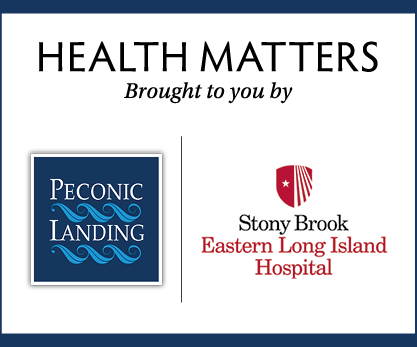
Heart Health Tips for Older Adults
Each day, your heart pumps approximately 2,000 gallons of blood throughout your body, sending out oxygen and vital nutrients to sustain your well-being. American Heart Month is a great time to focus on your cardiovascular health and implement some simple lifestyle changes that can make a big impact. We asked two local cardiologists to tell us how older adults can protect this important organ. Here are their top five tips:
1. Recognize the importance. Dr. Travis Bench, Interventional Cardiologist at Stony Brook Medicine, highlighted just how important it is to maintain a healthy heart. “Approximately one of every three deaths in the United States is caused by cardiovascular disease,” he said. “Every 34 seconds, an American has a heart attack.” Dr. Bench is also a Clinical Assistant Professor of Medicine as well as the Co-Director of Cardiology Ambulatory Services Strategic Planning at the Stony Brook Medicine Heart Institute.
2. Keep moving. Staying active is one of the best things that older adults can do for their heart health. Dr. Michael Sorrentino from NYU Langone East End Cardiology holds office hours in the Center for Well-Being at Peconic Landing, a Continuing Care Retirement Community in Greenport. “The vibrant older adults I see at Peconic Landing have something in common – they all stay extremely active,” said Dr. Sorrentino. It can be as simple as walking, which is free and easy. “Choose a parking spot further away than you normally would,” he suggested.
3. Swap healthier options into your diet. We all know that eating healthy is important, but with so many diet trends out there, it’s difficult to know where to start. Dr. Bench advises us to keep it simple. “Limit your dietary intake of processed foods and refined sugars in favor of vegetables, nuts, fruits, whole grains, fish, and unsaturated fats,” he said.
4. Pay attention to warning signs. Warning signs of heart disease can include shortness of breath or an abnormal heart beat, commonly referred to as palpitations. “Look out for chest pain which may radiate to the neck, back, left arm, or shoulder,” said Dr. Bench. “Most commonly this discomfort would be reproduced by physical activity.” Both doctors also advised that the risk of cardiovascular disease is commonly underestimated in women. “Many females experience atypical symptoms of heart disease like gastrointestinal issues or fatigue which can be easily overlooked,” said Dr. Sorrentino.
5. Talk to your doctors. “It’s so important to reach out,” said Dr. Sorrentino. “Communicate with your doctors and be sure to tell them any changes you notice in your body or any symptoms you are experiencing.” Dr. Bench agreed, “Discuss your individual risks with your doctor.”
Find Dr. Bench at Stony Brook Cardiology in Center Moriches or Southampton. Schedule an appointment by calling (631) 702-8327 or learn more at heart.stonybrookmedicine.edu.
Find Dr. Sorrentino from NYU Langone East End Cardiology at the Center for Well-Being at Peconic Landing in Greenport.